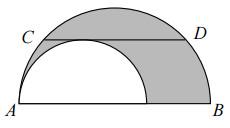Sunday Afternoon Maths LI
Doubling cribbage
Brendan and Adam are playing high stakes cribbage: whoever loses each game must double the other players money. For example, if Brendan has £3 and Adam has £4 then Brendan wins, they will have £6 and £1 respectively.
Adam wins the first game then loses the second game. They then notice that they each have £180. How much did each player start with?
Show answer & extension
Hide answer & extension
Working backwards: before the second game, Brendan must have had £90 and so Adam had £270.
Before the first game, Adam must have had £135, so Brendan had £225.
Extension
After the next game, one player will have all the money and no more games can be played. Hence £135 and £225 lead to a finite number of games being played.
If the player with the most money always loses, which starting values £\(A\) and £\(B\) will lead to finite and infinite numbers of games?
Two semicircles
The diagram shows two semicircles.
\(CD\) is a chord of the larger circle and is parallel to \(AB\). The length of \(CD\) is 8m. What is the area of the shaded region (in terms of \(\pi\))?
Show answer & extension
Hide answer & extension
The question does not fix the length of \(AB\), yet implies that there is a unique answer. Therefore we can take \(AB\) to be any length we like and expect the right answer. If \(AB\) is 8m long, then the unshaded semicircle has no area. Therefore the shaded area is \(\tfrac12\pi\times4^2=8\pi\)m.
Extension
How would you calculate the area if you don't assume that the length of \(AB\) doesn't affect the area?
What is the sum?
What is \(\displaystyle\frac{1}{\sqrt{1}+\sqrt{2}}+\frac{1}{\sqrt{2}+\sqrt{3}}+...+\frac{1}{\sqrt{15}+\sqrt{16}}\)?
Show answer
Hide answer
Start by rationalising the denominators:
$$\begin{array}{rl}
\frac{1}{\sqrt{n}+\sqrt{n+1}}
&=\frac{1}{\sqrt{n}+\sqrt{n+1}}\times\frac{\sqrt{n}-\sqrt{n+1}}{\sqrt{n}-\sqrt{n+1}}\\
&=\frac{\sqrt{n}-\sqrt{n+1}}{n-(n+1)}\\
&=\sqrt{n+1}-\sqrt{n}\end{array}$$
Therefore:
$$\begin{array}{rl}
\frac{1}{\sqrt{1}+\sqrt{2}}+\frac{1}{\sqrt{2}+\sqrt{3}}+...+\frac{1}{\sqrt{15}+\sqrt{16}}
&=(\sqrt{2}-\sqrt{1})+(\sqrt{3}-\sqrt{2})+\\&...+(\sqrt{15}-\sqrt{14})+(\sqrt{16}-\sqrt{15})\\
&=-\sqrt{1}+\sqrt{16}\\
&=3
\end{array}
$$

